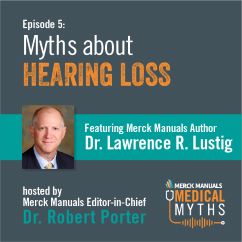Mastoiditis is a bacterial infection in the mastoid process, which is the prominent bone behind the ear.
Mastoiditis usually occurs when untreated or inadequately treated acute otitis media spreads from the middle ear into the surrounding bone—the mastoid process (part of the temporal bone—the skull bone that contains part of the ear canal, the middle ear, and the inner ear). Most mastoid infections are caused by pneumococcus bacteria. Pneumococcal conjugate vaccines have significantly decreased infection with pneumococcus bacteria, and mastoiditis is uncommon. Inadequately treated mastoiditis can result in deafness, blood poisoning (sepsis), infection of the tissues covering the brain (meningitis), brain abscess, or death.
Symptoms of Mastoiditis
Usually, symptoms of mastoiditis appear days to weeks after acute otitis media develops, as the spreading infection destroys the inner part of the mastoid process. A collection of pus (abscess) may form in the bone. The skin covering the mastoid process may become red, swollen, and tender, and the external ear is pushed sideways and down. Other symptoms are fever, pain around and within the ear, and a creamy, profuse discharge from the ear. The pain tends to be persistent and throbbing. Hearing loss can become progressively worse.
Diagnosis of Mastoiditis
A doctor's evaluation
Computed tomography
Doctors typically base the diagnosis on the person's symptoms. Doctors usually do computed tomography (CT) to confirm the diagnosis. To identify the bacteria causing the infection, doctors take samples of the discharge from the ear so that the bacteria in the discharge can be grown in a laboratory (cultured). If people do not have a discharge, doctors use a needle or make an incision in the eardrum and take a sample of the fluid from the middle ear.
Treatment of Mastoiditis
Antibiotics by vein or mouth
Sometimes, surgery
Most people with mastoiditis are immediately given an antibiotic (such as ceftriaxone or vancomycin) by vein. People who are not seriously ill may instead be given a fluoroquinolone antibiotic (such as ciprofloxacin) by mouth. After this initial treatment, doctors use the results of the laboratory culture to determine the best antibiotic to use. Antibiotics may be given by mouth once the person starts to recover and are also continued for at least 2 weeks.Most people with mastoiditis are immediately given an antibiotic (such as ceftriaxone or vancomycin) by vein. People who are not seriously ill may instead be given a fluoroquinolone antibiotic (such as ciprofloxacin) by mouth. After this initial treatment, doctors use the results of the laboratory culture to determine the best antibiotic to use. Antibiotics may be given by mouth once the person starts to recover and are also continued for at least 2 weeks.
If an abscess has formed in the bone or if infection and inflammation become chronic, surgical removal of the infected part of the bone (mastoidectomy) and corrective surgery are required. If the abscess does not drain, a tympanostomy tube is placed so that the infected fluid can drain out of the middle ear. Then people are treated with fluoroquinolone antibiotic ear drops for 2 to 3 weeks. People are also instructed to place a cotton ball lathered with petroleum jelly in the ear when they take a bath or shower to prevent water from getting in the ear. Swimming should be avoided.
Drugs Mentioned In This Article




